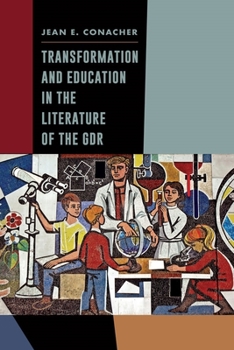Transformation and Education in the Literature of the Gdr
(Book #206 in the Studies in German Literature Linguistics and Culture Series)
This book explores how writers adhered to, played with, and subverted the formulaic precepts of educational transformation in the German Democratic Republic.
Perhaps never before has a state emphasized education to citizenship more than in the new nation founded in 1949 as the German Democratic Republic. For forty years, educational and cultural policy played a pivotal role in effortsto build and sustain a socialist state on German soil. Party and state held teachers and writers responsible for demonstrating the superiority of socialism, infusing pupils and readers with a commitment to the emerging state, andproviding persuasive role models of der neue Mensch each was challenged to become.
Utilizing an innovative triangular framework, this book demonstrates how mentor-proteg (e) rubrics, traditionally associated with the socialist Bildungsroman, came to characterize text-external and text-internal relations within diverse narrative forms. Thus, leading writers such as Hermann Kant, Christa Wolf, Brigitte Reimann, and Christoph Hein played with the genre's patterns of transformation as they engaged with the intellectual, societal, and aesthetic dilemmas of GDR life. This book shows that understanding representations of educational transformation in GDR literature, a topic largely overlooked by critics, is central to an aesthetic appreciation of that literature more broadly.
Perhaps never before has a state emphasized education to citizenship more than in the new nation founded in 1949 as the German Democratic Republic. For forty years, educational and cultural policy played a pivotal role in effortsto build and sustain a socialist state on German soil. Party and state held teachers and writers responsible for demonstrating the superiority of socialism, infusing pupils and readers with a commitment to the emerging state, andproviding persuasive role models of der neue Mensch each was challenged to become.
Utilizing an innovative triangular framework, this book demonstrates how mentor-proteg (e) rubrics, traditionally associated with the socialist Bildungsroman, came to characterize text-external and text-internal relations within diverse narrative forms. Thus, leading writers such as Hermann Kant, Christa Wolf, Brigitte Reimann, and Christoph Hein played with the genre's patterns of transformation as they engaged with the intellectual, societal, and aesthetic dilemmas of GDR life. This book shows that understanding representations of educational transformation in GDR literature, a topic largely overlooked by critics, is central to an aesthetic appreciation of that literature more broadly.
Format:Hardcover
Language:English
ISBN:1571139559
ISBN13:9781571139559
Release Date:January 2020
Publisher:Camden House (NY)
Length:308 Pages
Weight:1.45 lbs.
Dimensions:1.0" x 6.0" x 9.1"
Customer Reviews
0 rating





